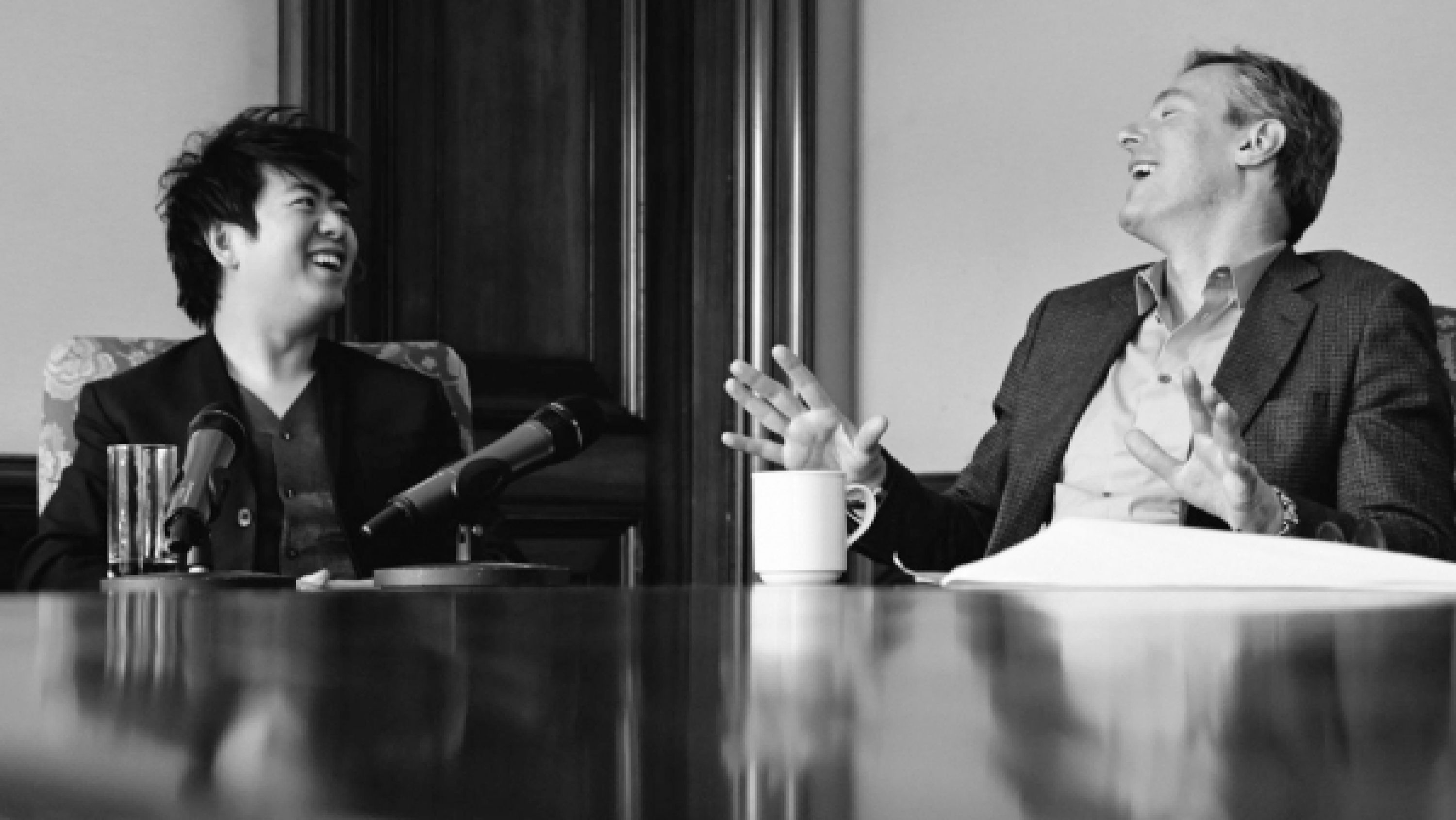How does something new come into existence? How can perfection be attained – be it in classical music or mobile communication? Pianist Lang Lang and technology entrepreneur Dr. Paul E. Jacobs, superstars in their respective fields, met to discuss formative influences, motivation, and goals – and the burden of responsibility that comes with exceptional talent. They spoke in Los Angeles, where Lang Lang was staying for a series of concerts. Between two performances with Venezuelan conductor Gustavo Dudamel and the Los Angeles Philharmonic Orchestra, he found time for an encounter at which the Chinese musician and the American entrepreneur discovered a wealth of common ground.
Paul E. Jacobs: I think great things come from exploring ideas and working together across disciplines. As you may know, I’m currently helping to endow an institute at the University of California, Berkeley. The goal is to create design studios where inter-disciplinary teams made up of artists, engineers, and designers can collaborate and build projects. I think interaction among people of different backgrounds is critical today.
Lang Lang: Yes, it’s important to move outside your own comfort zone and learn from many different types of people. As a musician, I’m always looking for opportunities to play with other kinds of musicians, be it chamber orchestras, accompanying singers, or jazz musicians. The best way to learn is from colleagues in other fields. You just need to find the right ones.
Jacobs: Exactly. I think those of us working in technology have a lot to learn from artists. When Apple brought out the iPhone some years ago, I had been building smartphones for a long time. But the technology itself could only go so far. Then Steve Jobs introduced a device that combined art and technology. He showed us that when you bring the two together it can be emotionally engaging in a way that technology alone could never be. A question I’ve been thinking about is whether it’s possible to create a machine capable of human-like creativity. Will a computer ever do something that could touch our emotions the way you do with your music?
Lang Lang: I know of an electronic piano that can play quite well by itself, but based on records of great pianists. Maybe if technology advances it would learn to adapt the music in some way and offer its own unique interpretation – perhaps even improve on the original. I suppose it is possible. I just hope that if that day comes I will still have opportunities to perform in concert.
Jacobs: You shouldn’t need to worry about that. [Laughs]
Lang Lang: But you raise an interesting question. In both our fields – the performing arts and technology – there seems to be a strong drive toward advancement. The need to excel is something our professions share.
Jacobs: That’s true. In fact, I’m sort of absurdly competitive. When I was a kid growing up, my brothers and I would play basketball together. When someone would go to shoot, the goal was to try to push his body into the garage door. It’s funny that even today when I play with other executives my age, we all still play the same kind of “tackle basketball” game. It never leaves you. I think competition is a big driving force. You just have to manage it so that it doesn’t turn into something destructive. It has to be channeled for constructive ends. I succeed at that for the most part, but it’s always a challenge.
Lang Lang: The competitive spirit can be a problem in the arts as well. As a pianist, if you’re only thinking about how to be the best, you end up being just the opposite – the worst. The key is to focus on making music by tapping into your innermost feelings. As you open yourself up to that and incorporate the best of what you learn from others, you begin to develop your own style.
Jacobs: I think there are similar tendencies in my field as well. It’s very exciting for me to be successful at taking an idea that I have in my head and creating a team, where we can bring something to life that started as nothing more than an abstract thought – especially when it can help people in a positive way around the world. I imagine the same must be true when great artists touch peoples’ lives with what they feel inside.
Lang Lang: Yes, music can be tremendously powerful. And it’s definitely the job of the performer to make it so. However, at the end of the day, getting good at performing on the piano or any instrument has also a lot to do with practice. There is no getting around that basic fact.
Jacobs: For me, it was always about learning as much as I could. When I was young, I worked at my father’s first company every summer. I did every kind of engineering there was, and he made sure I did something different every summer. During my undergraduate and graduate years at Berkeley, it was the same thing – I tried to learn as much as possible. I made sure I had a very fundamental base in engineering skills. When I got to Qualcomm, I did engineering for a while, and then I got into the business side. I really tried to learn lessons all the time. One of my board members reminded me that the School of Hard Knocks is an expensive one. Some mistakes can be very expensive. But I’ve always tried to learn from them. I think that’s what you have to do. You have to observe how things go when you make certain decisions and lead a certain way. The notion of getting the basics down is critical in technology, in business, and clearly in the work you do.
Lang Lang: When it comes to my own playing, I’m extremely critical. I’m always looking at how things could be improved. But when I work with other people, I try to give them room to grow and express their own ideas. Then it’s less about me being self-critical, and more about building a team.
Jacobs: I try to put myself in situations where I have to stretch. I feel that the only way to grow is to make yourself as uncomfortable as possible. But when it comes to other people, very much like my father, I give them opportunities and see whether they step up and achieve. That can be difficult. Sometimes your first inclination is to throw somebody a life preserver when it looks like they are sinking. But you can’t do that, because then you’re training them not to swim on their own.
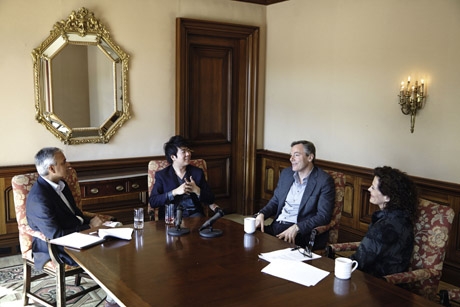
Masters of their respective keyboards: During a stopover in Los Angeles, Lang Lang invited technology entrepreneur Paul E. Jacobs and facilitator Ulrike Krause together with Pavan Vohra (1962-2016), “Connecting Leaders”, to a meeting at his hotel.

“Competition is a big driving force. It just has to be channeled for constructive ends.”
- Paul E. Jacobs
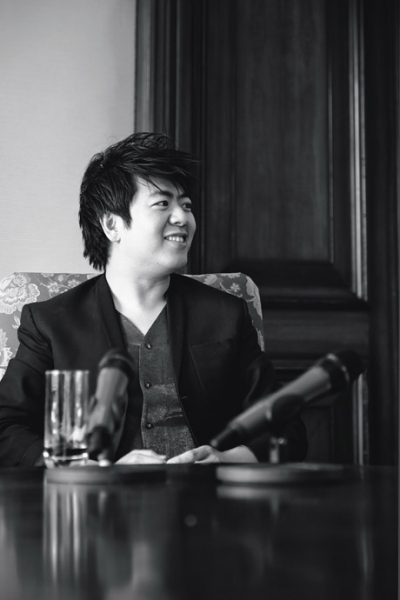
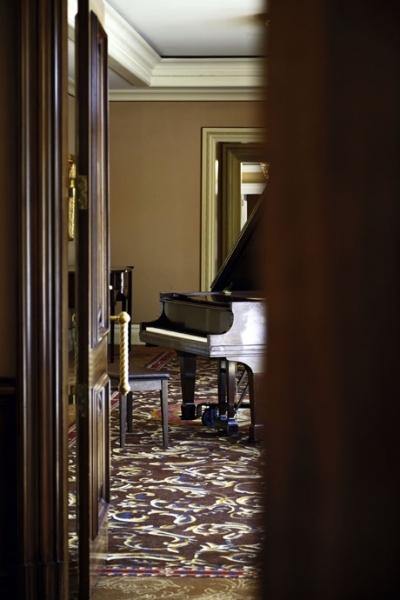
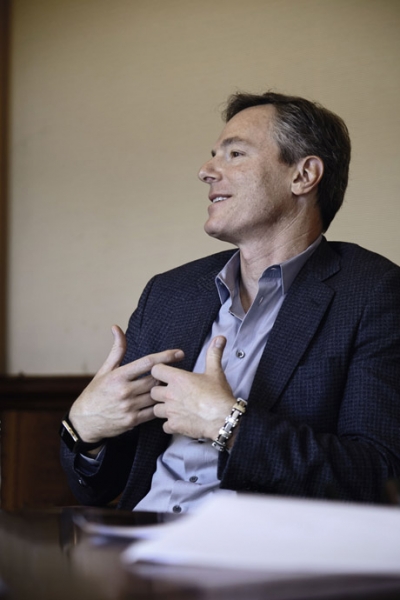
Lang Lang: Let me just pick up on what you said about the School of Hard Knocks, because I also learn a lot when things don’t work out the way I hoped or planned. I’m always trying to avoid problems, but sometimes they can’t be prevented. I remember when I was seven years old and joined my first national competition. I had always been very good in my hometown, but this was the first time I played the piano at the national level. It was a failure. I came in seventh place. They gave me a toy dog as a consolation prize. At first I hated that dog. But then I made friends with it, because every time I looked over at it, it would encourage me to play better.
Jacobs: I have a similar story, although it was a different sort of competition. We spent a lot of time designing a particular phone. It was the smallest phone you could make at that time, and very beautiful. We had worked with an industrial design firm and created a big marketing campaign around the product. It sold well at first, but then the handsets started coming back because the plastic had a flaw that caused it to crack. It cost tens of millions of dollars to solve the problem. By the time we had addressed it, we had missed the opportunity. To this day I still keep one of the images from that marketing campaign in my office. It reminds me that having a good idea is not enough. If you don’t execute it well, you’re going to fail. It’s also a reminder that you have to learn from your mistakes. As long as you’re passionate and keep picking yourself up after you fall, you’re going to do better the next time. It’s all part of the process.
Lang Lang: It’s the same for musicians. Although I must say that when I was a kid, picking myself back up was a challenge, because it was always my father insisting that I keep going. He used a tough-love approach with me. At times he went too far and really pushed me to the limit. I don’t think that was really necessary. Maybe it was because he’d had big dreams when he was young and they didn’t work out. Fortunately, we get along much better today. People say that this sort of pushing triggers top performers, but I don’t believe it. If my father hadn’t been as hard as he was, I would still have played just as well. I remember when I came to the U. S. and my teacher asked, “So, what do you want to become?” Instead of answering that I wanted to be a great pianist or musician, I said that I wanted to win every competition in the country. My teacher told me this was a crazy attitude for a musician. He explained that I should be thinking about how to become a great musician, not worrying about how to win competitions. Having a strict coach can help you learn to play fast or make you technically flawless. But that will not help you become a better musician. True musicianship is not something that can be forced, it has to come out naturally on its own.
Jacobs: I’m very fortunate that my father always encouraged me and gave me the freedom to take risks. His message to me was that if I worked hard, did a good job, took appropriate risks, built a good team of the best people, took the high road, and did the right thing, then I could be successful. He didn’t push so much as lead by example. When I find myself in trouble, I often think back on the lessons I learned from him. For example, I remember when I was running our handset business. I had this idea of promoting “us versus them” as a way of creating cohesiveness in my team. But I came to realize that when you do this, everybody else models that behavior and you end up fracturing your organization. So I switched tactics, and tried to lead by becoming a better role model. I worked to articulate a vision of what was possible, and invited people to align themselves with that vision. It was a much less top-down and fractious approach. And it worked.
Lang Lang: Your father is a very impressive entrepreneur. Have you ever worried about living up to the successes he has had?
Jacobs: Strangely enough, no. I’m not sure why, but there has never been a monkey on my back telling me to do what he did. Maybe it’s because even though it looks like we did pretty much the same thing, I actually veered in a different direction. He was very focused on radio design, and I was much more focused on the application of new technologies like GPS and software. I think that caused me to stake out my own territory. But tell me more about your own journey. It must have been something of a culture shock for you to settle here in the U. S. How did that affect your learning and development as a musician?
Lang Lang: Coming to the U. S. in 1997 was a huge change for me. At the time, China was still very conservative and the cultural life was not as rich as it is today. When I came to the U. S., everything seemed so much more open and free. The day I arrived, I heard hip-hop music for the first time. People were relaxed and easygoing. They used to ask me why I was practicing my music all the time. They reminded me to let go and enjoy life. That sort of freedom gave me the space to be the performer I am today. You never know where a good idea that will impact your work is going to come from, but giving people the time and space to explore and experiment is definitely conducive to that.
Jacobs: Yes, I think the freedom you’re describing is critical to innovation. Another quality we try to foster in our organization is diversity – be it geographical, ethnic, or gender. We have tried to make sure that the company has that. We also have mechanisms to promote creativity. Like you said, you never know where a triggering thought or creative concept will come from. One of our more interesting projects came from someone in finance! It’s very motivating for people to know that a good idea can come from anywhere in the company.
Lang Lang: I think the notion of inclusion is an important one. I’m always trying to develop new audiences for classical music, particularly with young people. I do this by looking for the right partnerships to reach their fan base. That is one of the reasons I partnered up with Metallica at this year’s Grammy Awards. How are you trying to expand the audience for your technology?
“I can’t perceive myself in any other way than wanting to find the next thing and bring it to life.”
- Paul E. Jacobs
Jacobs: That’s an interesting question. I see the cell phone as a platform for other people and other companies to build upon. That has given me a lot of opportunities to reach out to other industries and make connections and partnerships that can expand our scope. This has led to some very exciting research. In fact, we are currently working with somebody who is developing a sensor that is smaller than a grain of sand. It will be carried inside your bloodstream and be able to tell you two weeks ahead of time if you are going to have a heart attack. So before anything goes wrong, your phone will ring and tell you, “Go to the doctor!”
Lang Lang: I know some musicians and conductors who could benefit from that, as they tend to get very excited when they play music. [Laughs]
Jacobs: It’s really fun to work in this field because you learn about fascinating science fiction-like inventions – and the people who are actually creating them. For example, right now we are working to build digital brains. They are capable of doing things that have very human, or biological, characteristics.
Lang Lang: That is very cool. It seems like there is always some new breakthrough waiting to happen that will open up new areas of possibility.
Jacobs: It’s interesting to me that even though you and I work in very different fields, we both care deeply about education.
Lang Lang: Yes, education and charity have become top priorities for me. In 2008, I founded an organization, the International Music Foundation. One of its missions is to help America’s public schools rebuild their music programs. At the moment we are setting up a really good program in the Boston Arts Academy. We gave them forty pianos and keyboards, and hired music teachers so they could learn to play. The kids in the program have an interest in music but have never had any formal musical training. They are not practicing to be professionals. A year into the program, we are now trying to gauge what level they are at. I’m very curious to see how they are progressing.
Jacobs: What lessons have you taken from your own education? Are there aspects you’re carrying forward into the work you’re doing now motivating and teaching others?
Lang Lang: I’ve had many different teachers. Some I liked, some I didn’t. But the best teachers helped me understand the value of stretching yourself beyond your natural comfort zone. If you only help students play their favorite pieces, they won’t be able to play anything except for that particular style. So, as an educator, you have to ask students to play the complete opposite of what they like and learn from that experience. I remember how hard it was for me to play slow when I was a kid. I really needed to learn how to calm down and put my heart and soul into the slow passages. I spent a lot of energy on that, but I’m glad I did. Without that transformation, I would probably be playing nothing but fast pieces today. That would drive me crazy!
Jacobs: I’ve always been fascinated with how musicians develop and inject personality into a piece of music. How do you foster that ability?
Lang Lang: It can be a challenge in classical music because there are a lot of rules to follow. But some people are able to follow the rules in very personal ways, while others follow them as if they’re written in stone. If you do that all the time, you will probably not develop your skills in a unique way. When I set out to identify talent, what I’m looking for are young pianists with a distinctive sound. I try to see whether they have a personality that can be developed into something unique and unexpected. I’m also looking at how they do things other than play the piano – like the way they talk, the way they think about things, whether they analyze music, and so on. I don’t like it when someone insists that there is only one right way to play Mozart or Bach. I’m not looking for that sort of musician. I am looking for young people who are curious and open-minded about music but also interested in the world around them.
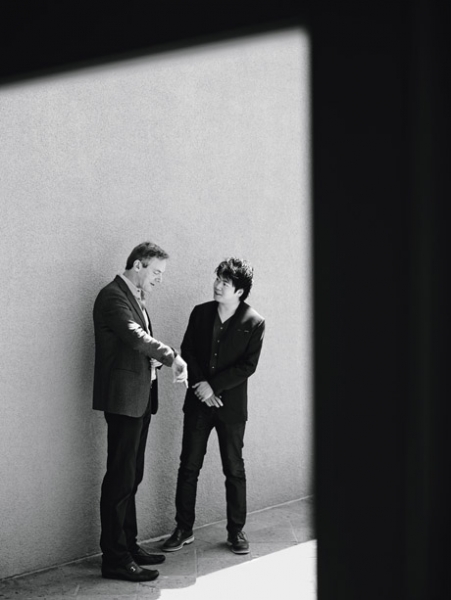
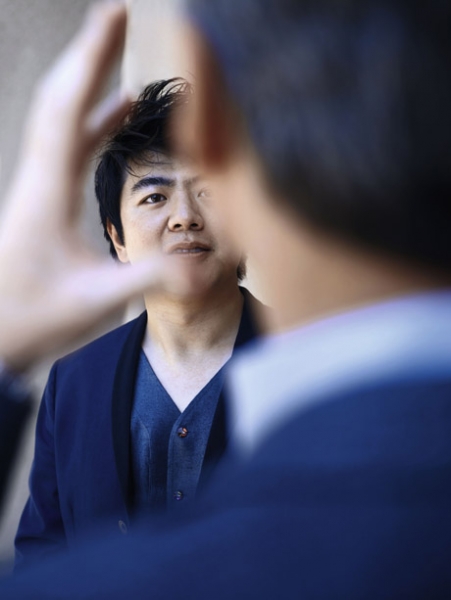
“ Having a strict coach can help you learn to play fast or make you technically flawless. But that will not help you become a better musician.”
- Lang Lang
Jacobs: Yes, curiosity is absolutely key. I can’t perceive myself in any other way than just wanting to find the next thing and bring it to life. And that’s the sort of trait I look for in others as well.
Lang Lang: Another thing I would add is that young pianists have to be able to interact with other musicians, because that is how you learn to communicate with your instrument. I think the process of making music together is the fastest and most efficient way to learn. I imagine the same would be true in your line of work.
Jacobs: There is no question about it. You can sit back and theorize all you want in your ivory tower and you may think you know what the issues are all about – but you are probably wrong. Very often the issues are far subtler than the ones you’ve theorized by yourself. I think having a critical mass of people that are all focused on a similar kind of theme can help a lot. When you put enough people together, they are more likely to excel. That’s when the magic happens. So I think proximity and interaction are both critical. When it comes to finding young leaders, I think another critical quality is passion. If you have a passion for something and can convey it to your team, that can help move the organization in a beneficial direction. That said, I never want our leaders to be too directive. It takes a light touch to be a good leader. The best leaders push decision-making downward, so that people have not just the responsibility but the authority to do things. If you’re too heavy-handed, people don’t feel a sense of ownership.
Lang Lang: You said that you’re always looking to find the next big thing and bring it to life. What are you working on at the moment?
Jacobs: Well, now that I’m no longer a CEO, I have this idea that I want to do some big sort of crazy, almost impossible thing. So often when people talk about developing the next generation of wireless, for example, they mean making phones faster and adding a few new features. That’s too linear for me. I want to do something non-linear. Maybe one of those things will be to re-invent the Internet so that it actually works better for people – so that it protects people’s privacy and is less susceptible to malware, for example. I think this may be doable, because most of the Internet actually flows across mobile devices now, and they turn over very quickly, which means that the whole industry could actually get behind something like that. So I want to see if we can make that happen. It would be great fun. What lies ahead for you? What’s your next big thing?
“I am looking for young people who are curious and open-minded about music but also interested in the world around them.”
- Lang Lang
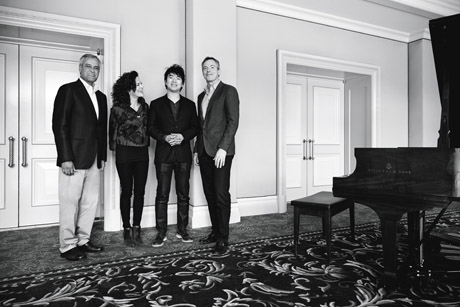
Lang Lang: A lot of my work is focused on education and working with young people. For the first time this year, I’m not just playing at the United Nations’ Day Concert, I’m also producing the event. I’m working to create a world youth orchestra with musicians from around the world who are under the age of 21. I think this kind of production has the power to unite and energize the next generation of musicians. I can always play a concert. In fact, every year I perform at important venues. But performing doesn’t influence other musicians. It doesn’t influence our society. It just generates more fans and more recognition for myself. That’s why I want to create something that can really touch young people. Music has changed my life and shaped my worldview. It can foster love, passion, self-confidence, and open dialogue. That’s something I would like to share with people – especially kids.
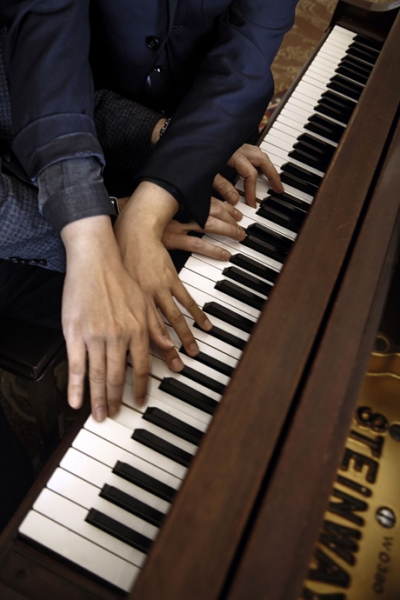
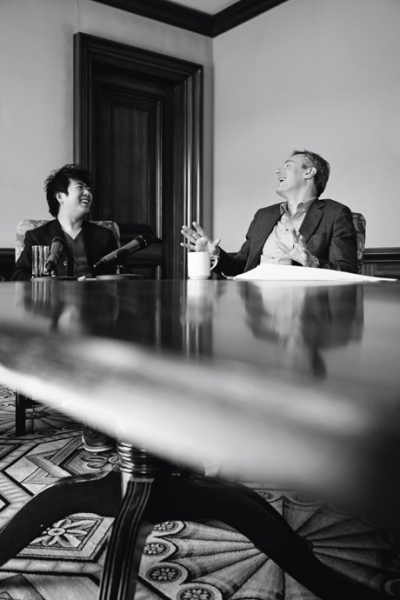
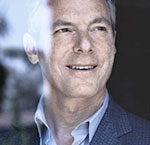
Paul E. Jacobs,
born in 1962, is Executive Chairman of Qualcomm, a mobile telephony R & D corporation headquartered in San Diego, California. The company was founded by Dr. Jacobs’ father, Irwin Jacobs, in 1985 and is now one of the world’s three largest chip producers. After obtaining his doctorate from the University of California, Berkeley, in 1989 and completing a research posting in Toulouse, Paul Jacobs joined Qualcomm as a development engineer in 1990, when he was only its 33rd employee. Five years later, he became Vice President and General Manager of the Combined Handset and Integrated Circuit Division. Between July 2005 and March 2014, Dr. Jacobs was the company’s CEO before handing over to Steve Mollenkopf, the first CEO from outside the family. Dr. Jacobs, who has filed over 50 patents relating to his own inventions, holds a series of appointments, including Chairman of the US-Korea Business Council, Chairman of the Engineering Advisory Board of the University of California, Berkeley’s College of Engineering, Vice Chairman and co-owner of the NBA team Sacramento Kings, and member of the World Economic Forum’s International Business Council.
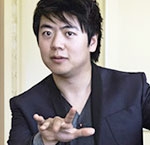
Lang Lang,
born in the Chinese city of Shenyang in 1982, is one of classical music’s all-time superstars. As he has often recalled, he was just two years old when he watched a Tom and Jerry cartoon and heard Tom playing Franz Liszt’s Hungarian Rhapsody No. 2. This unconventional role model inspired the young Lang Lang to learn the piano, an ambition that his parents supported wholeheartedly. He won a local competition at the age of five and began studying at Beijing’s Central Conservatory of Music when he was just nine. At the age of eleven, Lang Lang won first prize at the International Competition for Young Pianists in Ettlingen. His big break came in 1999, when he stepped in at short notice to replace the indisposed André Watts at the Galaxy of Stars, part of the Ravinia Festival held near Chicago, with a performance of Tchaikovsky’s Piano Concerto No. 1. In 2003, he made his Carnegie Hall debut with a recital that was a hit on both CD and DVD. Fêted back in his home country for his international success, Lang Lang has inspired many millions of young Chinese to start learning the piano. In 2013, Ban Ki-moon appointed Lang Lang a United Nations Messenger of Peace with a special focus on global education. This outstanding young musician is also committed to promoting the next generation of musicians through the Lang Lang International Music Foundation, which he set up in 2008.
PHOTOGRAPHY: JÜRGEN FRANK





